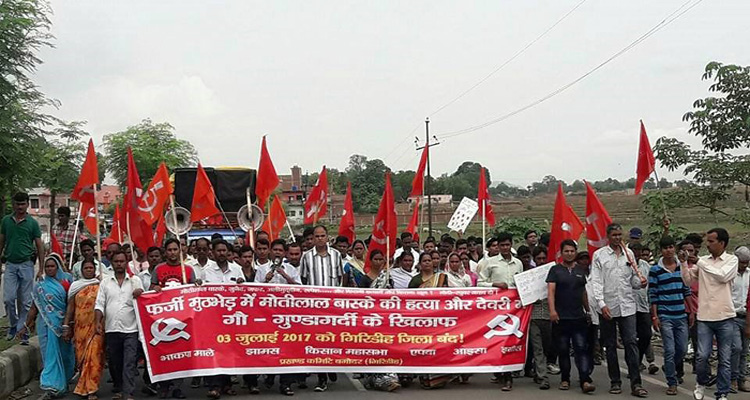
On 22 June evening 15-year-old Junaid was lynched to death near Ballabhgarh on a Mathura-bound train from Delhi. Junaid and his brothers were returning home after doing some shopping for Eid in Old Delhi. But the festivity of Eid was not for Junaid’s family in Khandawali. The spate of lynchings that had begun in 2015 with the killing of Abdul Ghafoor Quraishi in Nagaur and Mohammad Akhlaque in Dadri has now become almost an everyday national phenomenon. The rumours of beef consumption, cattle-theft and cow slaughter are no longer necessary as a pretext. Zafar Khan was killed because he had protested against the photography of women defecating in the open. Junaid was killed, as poet Madan Kashyap has written so evocatively, simply because he was Junaid, a young Muslim boy in Modi’s ‘New India’.
The lynching of young Junaid struck a chord with every sensitive Indian, and on 28 June India witnessed largely spontaneous demonstrations in several cities including Delhi, Mumbai, Kolkata, Chennai, Bengaluru, Hyderabad and Patna. London and Toronto also joined in. The demonstrators held placards and banners proclaiming ‘Not In My Name’, giving voice to the deeply felt disquiet and anguish of common Indians across the country and also among the diaspora. The next day Modi had to break his silence on the issue. Speaking on the occasion of the centenary of the foundation of the historic Sabarmati Ashram, he invoked Gandhi to say that Gandhi wouldn’t have approved of this violence. Modi’s belated words of cosmetic condemnation however did not deter the cow terrorists who feel empowered and emboldened under the current dispensation to beat up and kill people at will. Indeed, even as Modi invoked Gandhi in Ahmedabad, in Ramgarh in BJP-ruled Jharkhand Bajrang Dal and BJP activists lynched meat trader Alimuddin Ansari to death. Only a day before, dairy farmer Usman Ansari was grievously injured and his house set on fire by a mob of cow thugs in Deori block in neighbouring Giridih district.
The lynchings are not isolated instances happening randomly. There is a very clear socio-political context to all these incidents. The politics of the cow and the bogey of the so-called ‘pink revolution’ were invoked by none other than Narendra Modi in his 2014 campaign. BJP-ruled governments are giving the whole issue political legitimacy by banning slaughterhouses and cattle-trade. When a key accused in the Akhlaque murder case died, BJP leaders wrapped his body in the national tricolour. It is this relentless politicisation of the cow and the patronage and impunity extended to the cow terrorists that explain the present surge in the phenomenon of cow thuggery and mob lynching.
While Modi feels compelled to speak occasionally against fake cow protectors – after Una he had even asked these ‘fake protectors’ to kill him and spare his ‘Dalit brothers’ – the pro-BJP media and BJP intellectuals are busy ridiculing the protests, calling them selective, hypocritical and politically motivated. Amit Shah said there were more lynchings before Modi came to power and yet the protesters who had kept quiet then are now attacking Modi. A factual compilation of cases of lynching since 2010 to 25 June 2017 done by IndiaSpend.com shows that of the 63 cases, 61 or 97% happened after Modi came to power, 25 of them in 2016 and 20 till 25 June 2017 which clearly shows the escalation in recent months. In fact two more cases were reported from Jharkhand alone since June 25.
Apart from trying to negate the alarming rise in cases of mob lynching, something which has become the ‘new normal’ in Modi’s ‘new India’ by fudging figures, BJP leaders and intellectuals are also trying to discredit the protests by calling them selective and hypocritical. Their argument is that people protesting against the Ballabhgarh train lynching are selectively suppressing the case of lynching of DSP Ayub Pandith in front of Jamia Masjid in downtown Srinagar. The fact is that the #NotInMyName protests had clearly condemned all cases of lynching including that of DSP Ayub Pandith but the focus was clearly on the most recent and shocking case of killing of Hafiz Junaid. Ironically, the same BJP intellectuals who are accusing the #NotInMyName protesters of downplaying the brutal killing of DSP Ayub Pandith had described J&K police of being terrorists in police uniform with their heart being with Pakistan when some students were beaten by the police in the Srinagar NIT campus.
While pro-BJP TV channels went to the extent of trying to discredit the protests as Pakistan-inspired defamation of India, noted columnist and BJP intellectual and Rajya Sabha MP Swapan Dasgupta described the protests as an expression of ‘rootless cosmopolitanism’, even an act of ’emotional treachery’! This is almost like Asaram Bapu telling after the December 2012 Delhi rape that rocked the nation that Nirbhaya shouldn’t have resisted the rape, and treat the rapists as her brothers and beg for her life. Lynching is only a legal offence for the BJP ideologues; the politics of the cow that triggers most cases of lynching is however an article of faith in ‘cultural nationalism’ and those challenging this lexicon of ‘cultural nationalism’ stand guilty of ’emotional treachery’ and ‘rootless cosmopolitanism’. Mob violence is a tested and trusted method of the Sangh brigade whether it is employed in communal riots and genocides, demolition of the Babri Masjid or in the ongoing acts of cow terrorism and BJP intellectuals are willing to play the role of ‘rooted’ cheerleaders for these acts of unconscionable violence.
